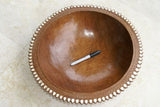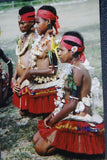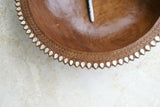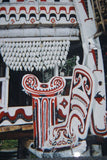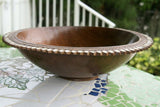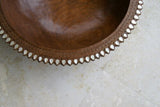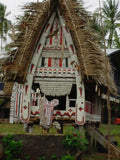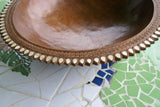STUNNING HAND CARVED ROSEWOOD WOOD MUSEUM MASTERPIECE SAGO PLATTER DISH BOWL WITH TEAR SHAPED MOTHER OF PEARL INSERTS & DELICATE LACY BORDERS RENOWNED TRIBAL SCULPTOR TROBRIAND ISLANDS MELANESIA SOUTH PACIFIC COLLECTOR DESIGN 2A42bis 17"x17"x5”
South Pacific Rare Art.
Hand-Carved Melanesian Rosewood Bowl with Mother Pearl Inlays
HUGE & Rare decorative sago bowl.
(seen on most of the photos that are not taken on the premises)
Reduced from an original $900.00 (when it was in the store)
Blond brown wood
Size is very large: 17" X 17" X 5"
Incredible work done with primitive tools.
Museum quality hand carving
Unique collectible
Unbelievable workmanship
Amazingly beautiful considering the basic tools used such as pieces of broken shells, rusted nails from shipwrecks found on the beaches, and sea ray, shark skin or an animal horn or tusk rubbed for days against the surface till all is smooth, among other sanding materials, and to produce a sheen on the wood.
We cover shipping out of pocket which is very high so please no low offers.
Terrific value for a very rare item & one of the most beautiful Trobriand platters i have ever collected, the wood grain and the craft work on it are both stunning and it is one of a kind!
This is a large Massim hand carved (and hand inlaid with mother of pearl) sago serving dish or bowl seen on most of the pictures, rosewood, also heavily decorated with inserts of mother of pearl and typical incised Trobriand designs. We have reduced all our rare Melanesian bowls for quick sales. This is a completely hand crafted item created out of 1 piece of precious wood.
We also show pictures of people and yam houses taken when we were there.
In perfect condition and a great value at that price. It is very hard to come across such colletibles unless you go there.
These beautiful receptacles are rare items of the Kula ring. We collected them there. We collected many beautiful pieces while in the Trobriands from carvings (created out of kwila, rosewood and ebony) to costumes, drums and Kula ring exchange items that we will list whenever we have time.
In these islands which are rarely visited, outside influence is at a minimum. The extremely skilled carvers inspire themselves from what is around them as they have access to nothing else: the natives, birds, fish, pigs, marine turtles, snakes and whatever they see in their dreams such as dragons or mystical figures.
Some of these items have very important meanings as they are used as part of the Kula ring trade system that has existed between the islands for centuries.
The Kula ring is a system of exchange involving annual inter-island visits between trading partners who exchange highly valued shell ornaments and other things during year long sea travels.
In his Argonauts of the Western Pacific (1922), Malinowski analyzed the kula ring, the exchange of shell valuables in a circle around the chain of these islands. These ornaments were traded from island to island in a counter-clockwise direction:
This trade ranged from a surplus of pigs and yams in the Trobriands to the fine art or pottery found in the Amphletts. Other places became known for obsidian and Betel nut. It is believed that this myth could be one of the origins of the and the way it functions. Kula is a ritualized trading culture existing in eastern Papua New Guinea which the Trobriands islands are part of. It is essentially a network of villages joined by a common trade route, known as the Kula ring. Kula was and still is a life sustaining cultural exchange. It is unfortunate that much of the time and energy that was used in the past to hold together the social foundation is now being clouded with the desire for money, a by-product of a tourism-based economy. With influences such as these and the advancement of technology, the intricate pattern in which traditional values are based is slowly eroding.
Kula is the basis of mental and physical well-being.












